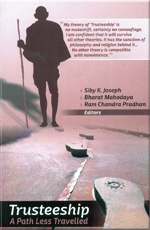Gateway House cordially invites you to an online discussion on:
Gandhian Trusteeship and Non-violence: the Basis for a Creative Society
India Economic, Business & Political Series)
with
Rajni Bakshi
Senior Gandhi Peace Fellow,
Gateway House
&
Ashni Biyani
Chief Ideator and Director,
Future Ideas
at
6:30 pm
On
Friday, 21 February, 2014
On
Google Hangout
A growing environmental crisis and the increasing inequality between the rich and the poor now constitute major risks to global economic and social stability. Societies around the world are struggling to address these issues. As the problems associated with these risks escalate, it is necessary to look at unconventional solutions. Mahatma Gandhi’s idea of Trusteeship is one such approach that can provide the basis for a creative new solution.
The idea of Trusteeship is based on the premise that you are never really the “owner” of wealth, but rather its temporary holder, a benevolent custodian. Gandhi was confident that eventually Trusteeship would offer an alternative to both capitalism and socialism. How did Gandhi conceptualise Trusteeship? How does the idea go beyond philanthropy and corporate social responsibility? Can Trusteeship become the foundation for a renewed, non-violent, and creative society?
Discuss these topics at a Google Hangout with Rajni Bakshi, Senior Gandhi Peace Fellow, Gateway House, in conversation with Ashni Biyani, Chief Ideator and Director, Future Ideas, on “Gandhian Trusteeship and Non-violence: the Basis for a Creative Society” on February 21, 2014 at 6:30 PM IST.
The live discussion will be interactive with the online audience. We invite you to post your questions in advance or during the hangout using #GHTrusteeship on Twitter or on the Google+ event page.
Click here to register for the event on Google
or
Click here to register for the event on email
February 21, 2014.
Sincerely,
Manjeet Kripalani & Neelam Deo
Directors, Gateway House: Indian Council on Global Relations
___________________________________________________________
Gateway House: Indian Council on Global Relations, 3rd floor Cecil Court, M.K. Bhushan Marg, Colaba, Mumbai 400 039
+91 22 2202 3371 begin_of_the_skype_highlighting +91 22 2202 3371 FREE end_of_the_skype_highlighting begin_of_the_skype_highlighting +91 22 2202 3371 FREE end_of_the_skype_highlighting| meetings@gatewayhouse.in | www.gatewayhouse.in
Gateway House: Indian Council on Global Relations is a foreign policy think tank in Mumbai, India, established to engage India’s leading corporations and individuals in debate and scholarship on India’s foreign policy and the nation’s role in global affairs. Gateway House is independent, non-partisan and membership-based.
________________________________________________________________________
Rajni Bakshi
Senior Gandhi Peace Fellow,
Gateway House
Rajni Bakshi is the Gandhi Peace Fellow at Gateway House, Mumbai. She is the author of a Gateway House research paper (October 2012) titled Civilizational Gandhi. She is also the author of several books, including Bazaars, Conversations and Freedom: for a market culture beyond greed and fear (Penguin, 2009), which won two Vodafone-Crossword Awards. Her earlier book, Bapu Kuti: Journeys in Rediscovery of Gandhi (Penguin, 1998) inspired the Hindi film Swades. Her other books include Long Haul: the Bombay Textile Workers Strike 1982-83 (1986); A Warning and an Opportunity: the Dispute over Swami Vivekananda’s Legacy (1994); Lets Make it Happen: a backgrounder on New Economics (2003); and An Economics for Well-Being (2007). Rajni has a BA from George Washington University, U.S, and an MA from the University of Rajasthan. She serves on the Boards of Child Rights and You (CRY) and Citizens for Peace. She is also a member of the Executive Committee of the Gandhi Smriti and Darshan Samiti, an autonomous body under the Indian Ministry of Culture, and a long-term associate of the Centre for Education and Documentation (Mumbai and Bangalore).
Ashni Biyani
Chief Ideator and Director,
Future Ideas
Ashni Biyani is associated with Future Group, a business house in India that operates retail chains such as Big Bazaar, Pantaloons, Central and Home Town. She is the Director of Future Ideas, a consultancy for strategic thought for business and society. She leads a team that maps the behavioral shifts of consumers and communities. She has also led the conceptualisation and launch of a number of the group’s retail formats. Ashni’s team is currently working on an assessment study for the Ministry of Social Welfare and Empowerment. Ashni graduated as a textile designer from the Srishti School of Art, Design and Technology, Bangalore. She has attended courses on scenario planning at New York’s Parsons School of Design, and the Summer Institute of General Management at Graduate School of Business, Stanford University, U.S.

